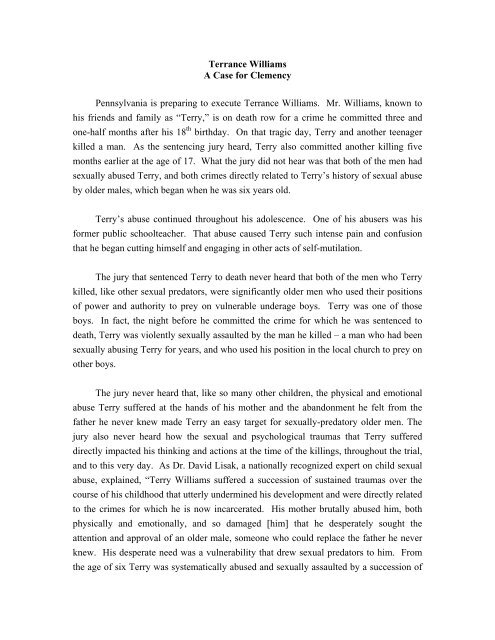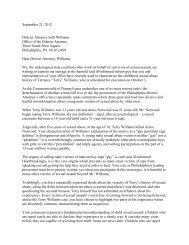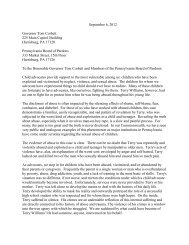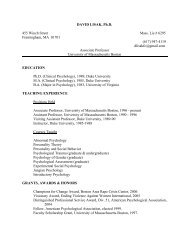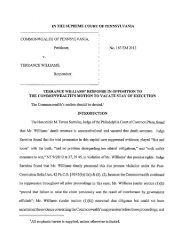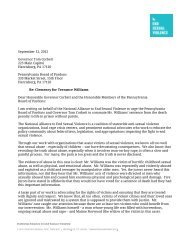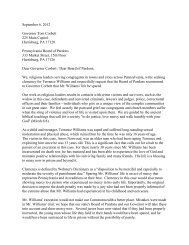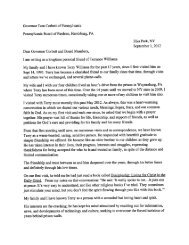Case Overview - Terry Williams Clemency
Case Overview - Terry Williams Clemency
Case Overview - Terry Williams Clemency
Create successful ePaper yourself
Turn your PDF publications into a flip-book with our unique Google optimized e-Paper software.
Terrance <strong>Williams</strong><br />
A <strong>Case</strong> for <strong>Clemency</strong><br />
Pennsylvania is preparing to execute Terrance <strong>Williams</strong>. Mr. <strong>Williams</strong>, known to<br />
his friends and family as “<strong>Terry</strong>,” is on death row for a crime he committed three and<br />
one-half months after his 18 th birthday. On that tragic day, <strong>Terry</strong> and another teenager<br />
killed a man. As the sentencing jury heard, <strong>Terry</strong> also committed another killing five<br />
months earlier at the age of 17. What the jury did not hear was that both of the men had<br />
sexually abused <strong>Terry</strong>, and both crimes directly related to <strong>Terry</strong>’s history of sexual abuse<br />
by older males, which began when he was six years old.<br />
<strong>Terry</strong>’s abuse continued throughout his adolescence. One of his abusers was his<br />
former public schoolteacher. That abuse caused <strong>Terry</strong> such intense pain and confusion<br />
that he began cutting himself and engaging in other acts of self-mutilation.<br />
The jury that sentenced <strong>Terry</strong> to death never heard that both of the men who <strong>Terry</strong><br />
killed, like other sexual predators, were significantly older men who used their positions<br />
of power and authority to prey on vulnerable underage boys. <strong>Terry</strong> was one of those<br />
boys. In fact, the night before he committed the crime for which he was sentenced to<br />
death, <strong>Terry</strong> was violently sexually assaulted by the man he killed – a man who had been<br />
sexually abusing <strong>Terry</strong> for years, and who used his position in the local church to prey on<br />
other boys.<br />
The jury never heard that, like so many other children, the physical and emotional<br />
abuse <strong>Terry</strong> suffered at the hands of his mother and the abandonment he felt from the<br />
father he never knew made <strong>Terry</strong> an easy target for sexually-predatory older men. The<br />
jury also never heard how the sexual and psychological traumas that <strong>Terry</strong> suffered<br />
directly impacted his thinking and actions at the time of the killings, throughout the trial,<br />
and to this very day. As Dr. David Lisak, a nationally recognized expert on child sexual<br />
abuse, explained, “<strong>Terry</strong> <strong>Williams</strong> suffered a succession of sustained traumas over the<br />
course of his childhood that utterly undermined his development and were directly related<br />
to the crimes for which he is now incarcerated. His mother brutally abused him, both<br />
physically and emotionally, and so damaged [him] that he desperately sought the<br />
attention and approval of an older male, someone who could replace the father he never<br />
knew. His desperate need was a vulnerability that drew sexual predators to him. From<br />
the age of six <strong>Terry</strong> was systematically abused and sexually assaulted by a succession of
sexual predators, including one of his teachers. He felt intense shame and disgust, and<br />
loathed himself. And over time, some of that hate began to turn towards the men who<br />
[were] preying on him.”<br />
In recent years, Pennsylvanians were horrified to learn that so many young people<br />
were sexually assaulted by clergymen. The horrors of child sexual abuse in this state<br />
continued when former Penn State football coach Jerry Sandusky was charged and<br />
convicted of sex crimes against young boys. Without intervention, the effects of<br />
childhood sexual abuse can have lasting, profound, and tragic consequences to the<br />
victims and those around them. Prosecutors, judges, legislators, and our Governor Tom<br />
Corbett have all rightfully acknowledged that much more could and should have been<br />
done to prevent the physical and psychological trauma wrought upon the victims abused<br />
by the clergy and Sandusky. <strong>Terry</strong> <strong>Williams</strong> never received any counseling or mental<br />
health treatment to deal with the effects of the abuse he suffered. No one – not a parent,<br />
not a teacher, not a doctor or clergy person – came to his aid. Instead, many of the<br />
people who should have helped <strong>Terry</strong> continued to prey on him.<br />
Like so many adolescent victims of sexual abuse, <strong>Terry</strong> felt intense shame that<br />
kept him from talking about what had happened to him. <strong>Terry</strong>'s history of sexual abuse<br />
was not presented at his capital trial because <strong>Terry</strong>’s lawyer failed to conduct any<br />
meaningful investigation into <strong>Terry</strong>'s background and ignored obvious evidence of abuse.<br />
While courts agreed that <strong>Terry</strong>'s lawyer failed him, those courts also said that evidence of<br />
sexual abuse would not have made a difference to the jury. However, in sworn affidavits,<br />
jurors who sentenced <strong>Terry</strong> have acknowledged that they would not have voted for a<br />
death sentence had they known about the sexual abuse he suffered as a child, the abuse he<br />
suffered at the hands of the men he killed, and the psychological impact of that abuse. In<br />
addition, several jurors have stated that they voted for <strong>Terry</strong> to be put to death only<br />
because they mistakenly believed that if they did not sentence <strong>Terry</strong> to death he would<br />
later become eligible for release on parole. In truth, both now and at the time of his<br />
sentencing, a life sentence in Pennsylvania meant that <strong>Terry</strong> <strong>Williams</strong> would never have<br />
been eligible for parole. Unfortunately, Pennsylvania is the only state in the country that<br />
does not require the judge to instruct the jury that a life sentence means life without the<br />
possibility of parole, and no such instruction was given in <strong>Terry</strong>’s case.<br />
2
In addition to the jurors, the victim’s widow does not want <strong>Terry</strong> executed for her<br />
husband’s killing. She has stated that she supports commuting his death sentence to life<br />
without the possibility of parole.<br />
<strong>Terry</strong> is deeply remorseful for his actions. There are no excuses or justifications for<br />
the crimes he committed. Nonetheless, the abuse he suffered provides significant insight<br />
into the betrayed, traumatized, and impaired thinking that led him to commit those<br />
terrible crimes. Pennsylvania should not execute <strong>Terry</strong> <strong>Williams</strong> because:<br />
• <strong>Terry</strong> suffered horrific sexual and physical abuse during his childhood and<br />
no one intervened to get him help when he was boy;<br />
• The jury did not know about his history of childhood sexual abuse and<br />
trauma;<br />
• The jury did not know that the men he killed were his abusers;<br />
• <strong>Terry</strong> was only 18 years old at the time of the crime for which he was<br />
sentenced to death and the jury did not know about the psychological<br />
impact of sexual abuse on someone as young as <strong>Terry</strong>;<br />
• Jurors did not know that he would never be eligible for parole;<br />
• Jurors have stated that they would not have voted for death if they had<br />
known about his sexual abuse and ineligibility for parole; and<br />
• The victim’s widow does not want <strong>Terry</strong> executed for her husband’s<br />
killing.<br />
For all these reasons, we urge the members of the Pennsylvania Board of Pardons,<br />
Philadelphia District Attorney Seth <strong>Williams</strong>, and Governor Tom Corbett to commute<br />
<strong>Terry</strong>’s sentence to life in prison without the possibility of parole.<br />
For more information, contact:<br />
Arianna Freeman,<br />
Attorney for Terrance <strong>Williams</strong><br />
215-928-0520<br />
Arianna_Freeman@fd.org<br />
3


